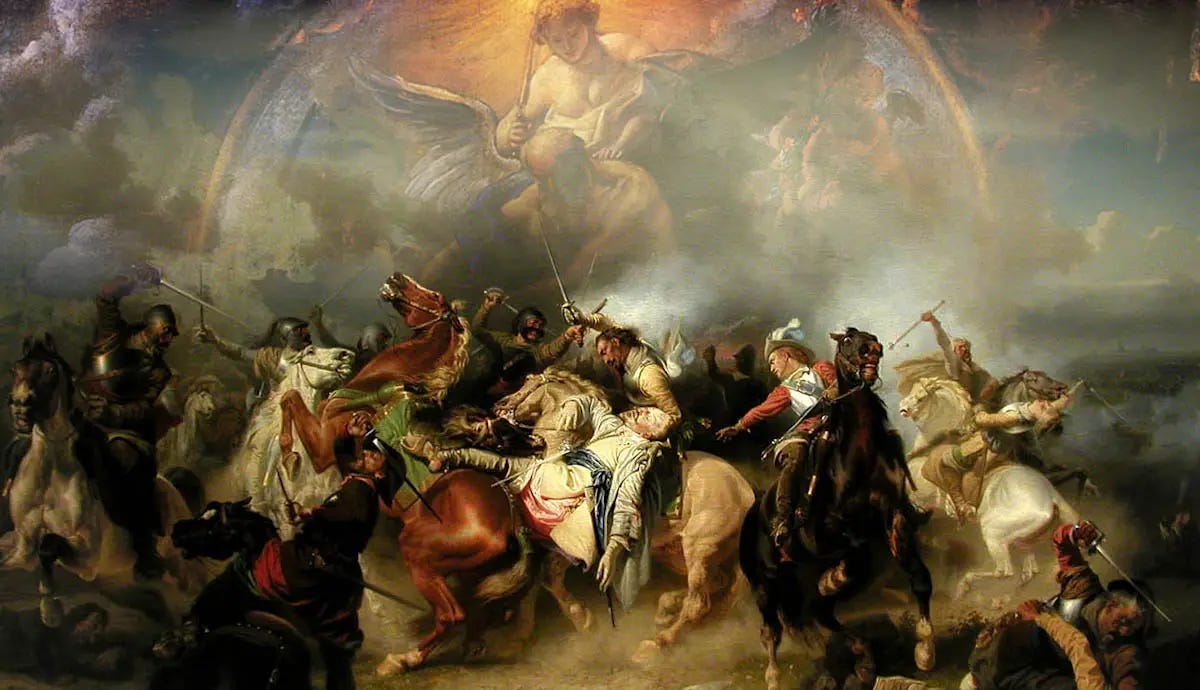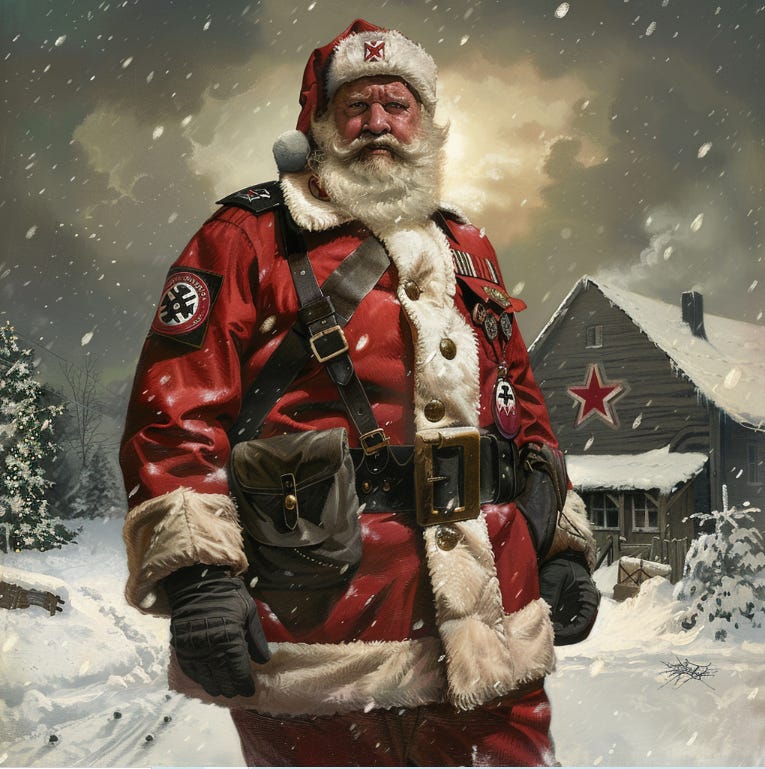[audio version of this post available here, courtesy of AskWho]
A Very Brief History of Peace
In ~1440 Gutenberg invented the printing press. Prior to this most transmission of ideas had to be done directly from one human to another. Putting words onto paper was a time-intensive application of a rare skill. Every book was a unique hand-crafted artifact, they were expensive and rare. After the printing press knowledge-bombs could be produced in mass numbers. Pamphlets could be passed around easily, and could be sent to distant cities. The churn of ideas among the intellectual classes exploded.
One of the most important books in Europe was the Bible, which suddenly became available for individual scrutiny and interpretation by anyone of means rather than just the well-gated clergy. Not everyone came to compatible conclusions.
In 1517 Martin Luther published his 95 Theses, igniting a firestorm among the dry fuel of religious turmoil that had been accumulating for decades. This is considered the start of the Protestant Reformation. Within a few years the first of the European Wars of Religion began. Fighting continued for over a century in what are considered some of Europe’s most brutal wars. ~5-20 million people died, out of an estimated ~75M.
Finally in 1648 the Peace of Westphalia formally ended these wars. No side could eliminate the other, and the survivors agreed that no matter how important questions of religion are, everyone would pretend that it was OK for other people to be damnably wrong. They would not use threat of violence to root out evil beliefs. Western liberalism grew from these fields of corpses and the conviction that we cannot return there.
An important part of the truce that western liberal societies came to was an informal understanding that under ordinary circumstance, people would not scrutinize their neighbor’s religious beliefs. To scrutinize them is to find them evil, which demands one oppose that evil. In return, their own beliefs would be left alone as well. Due to human nature one cannot discuss such things without become inflamed with passions, so they were not discussed at all.1
Can We Renegotiate That Peace?
As a Jehovah’s Witness, I hated knocking on doors to proselytize. It’s not that I didn’t want to talk to people about God. I had as much passion for it as anyone who really believes their religion and wants to save everyone they can and make the world a better place. It’s that I could feel how much we were despised for this. The low-key hate was palpable even for seven-year-old Eneasz. I really did not want to be hated. I especially didn’t want to intentionally go out and do this thing that would make everyone hate me. It felt awful.
I didn’t know why there was this hatred of proselytization. I was told it was because Satan hated the Truth, and hated those who spread it, and I just had to be strong. God was on our side. I guess I accepted this, but it didn’t make it not suck.
I doubt the people we bothered were consciously aware of why what we did was so abrasive, but now it seems pretty obvious. We were defecting on the Peace of Westphalia. We intentionally set out to criticize other people’s faith and convert them to ours. Centuries of cultural memory, encoded as social norms, warned everyone that we were risking a hundred years of murderous conflict by breaking that truce. No wonder we set all their teeth on edge.
The Jehovah’s Witness religion was born more than two centuries after Westphalia, during a period of religious blooming in America. Several of the new religions of this era rejected that tradition and included aggressive proselytization as a core tenet! They spread and survived long enough to become Legitimate Religions—now included in the cultural category of “beliefs that are protected by Westphalian convention.” A compromise had to be reached.
Fortunately(?) religious beliefs can be tamed and assimilated via legible rituals. Jehovah’s Witnesses wore quasi-ritual garments to proselytize and followed fairly prescribed scripts and practices. People did not appreciated being approached to partake in the ritual, but since the Jehovah’s Witnesses were legible about it, and quickly accepted any opting-out, it was tolerated to keep the peace.
In fact, our society is surprisingly chill about tolerating a very large variety of norm-breaking (and sometimes law-breaking) practices that are legibly coded as stable rituals.
The War On Christmas
But here’s the thing—Jehovah’s Witnesses often felt like there was a bit of a double standard. We weren’t allowed to push our beliefs on anyone else outside of very limited circumstances, and we got a lot of shit for it. But all the other Christians could push their beliefs on us all the time. They would bless us when we sneezed and expected us to do the same for them.2 They would constantly involve our children—trapped in state-mandated schools—in their rituals celebrating the false gods of lust, magic, devil-worship, and self-indulgence. Getting excused from these things was usually no big deal (though rarely a major hassle), but I would get default opted-in to these rituals if my parents weren’t vigilant.
The worst one of all was Christmas. It was a huge deal, the music inescapable, the pageantry permeated all school activities for weeks, and every single person you interacted with in even the most perfunctory commercial transaction would rope you into their worship acts with complete disregard for your beliefs. “Merry Christmas!” they’d say. Like a Christmas Nazi!
There was one bright side to all this. Every such religious invocation was an opportunity for micro-proselytization. Whenever someone said “Merry Christmas” we were encouraged to say “Thank you, but we don’t celebrate, we’re Jehovah’s Witnesses.” Do it enough times and it was guaranteed someone would eventually reply “Oh? Why not? What are Jehovah’s Witnesses?” and since we were invited to speak, by the rules of Fae Magick Westphalia we could now tell them the Truth about Jesus and Christmas and they would start down the road of conversion. Bringing up our religion in casual conversation was fair this one time, because they started it.
Of course they ignored us and this never went anywhere. Per Westphalia Christmas wasn’t part of our religion and that’s fine. Let the weird-religion-haver have his weird religion, don’t scrutinize or invite discord, none of it is important enough to throw society into chaos. In the entire history of Commercial Christmas not one person saw the Truth because a grocery shopping Witness said they don’t celebrate.
A Printing Press Is A Big Responsibility
In the recent past it was known that one doesn’t discuss politics or religion in polite company. Then Al Gore invented the Internet, and much like the printing press before it, it opened up a whole new ecosystem for ideas to explode across. Suddenly one could exchange ideas in nearly-real-time written conversations with limitless others. This new world was not bounded by previously-existing social compromises. It was agreed that anything which could be destroyed by the truth, should be.
The new spirit of inquiry that grew in this environment saw nothing of value in the cultural antibodies of Westphalia. It did not need the protection from scrutiny that had kept the old doctrines safe. It could stand up to scouring criticism because it was actually right. Or, if not right, at least far less wrong. New Atheism eschewed the aegis of the Peace, and it didn’t respect the protections it had given to religions. Religious beliefs were back on the menu. They did not fare well.
Nowadays western liberals mostly don’t criticize religious beliefs again, but it’s no longer because that Isn’t Done. It’s because no one cares. The New Atheists’ assault didn’t destroy religion directly, it exposed that there was almost nothing left to destroy. For the majority, Christianity was no longer a vital religion, and it hadn’t been for a long time.
This is said better by Tracing Woodgrains in his essay on Social Justice Progressivism [audio here, ty AskWho]. I’ll leave the details to him in that essay, or as discussed in this interview. The first insight I draw from it is that the vitalism of Christianity was strangled by the Peace of Westphalia. A religion is “the unified source of a person's moral and epistemic beliefs.” When one cannot act on their beliefs, those beliefs aren’t really the source of one’s actions, are they? If your beliefs tell you with all your soul that you cannot abide for a monstrous evil to exist alongside you, to see moral horrors committed in your own backyard, and yet you do nothing to stop them…?? In what sense are they driving you? If you suppress them for long enough, you will distort under that pressure. That drive will die within you.
Importantly, this is good if it turns out that the evil next door actually isn’t very bad, it’s just a different way of being, and you can all coexist peacefully. By not allowing people of different religions to murder each other this is exactly what the Peace of Westphalia showed to be true. It kept the outer trappings of religions preserved, as the inner workings atrophied. When New Atheism finally stripped away the Peace it was shown there was nothing underneath.
Everything Changed When The Fire Nation Attacked
The second insight drawn from Tracing Woodgrains’ essay is that many secular western people still have a vital religion. They still have a unified source of moral and epistemic beliefs. They still believe some things are true about the world because they were told to believe those things, and they still feel that there are monstrous evils living next door and moral horrors committed in their own backyards. But now the monstrous evils aren’t about souls damned to hell, they are about disparate racial impact and income gaps and respecting pronouns.
On Twitter Yassine Meskhout commented on the social separation of church and state:
There's a sort of peace treaty in place for religious beliefs in the discourse, a "don't ask don't tell" where religious friends agree not to proselytize in exchange for not having their beliefs scrutinized. It works OK.
But then I encounter folks today with beliefs that are qualitatively religious (unfalsifiable, belief in belief, internal contradictions, etc) but there's no similar peace treaty in place
I want to be able to say "ah I see that this is part of your religion" precisely to leave people alone with their beliefs. But no treaty is possible because neither side would agree to the terms (no proselytizing & no scrutinizing).
I don’t want to put words in Yassine’s mouth, he explicitly refuses to link these statements to Social Justice Progressivism (SJP), or Wokism, or any political ideology. However, I am repurposing his statements for my purposes…
I referred to the believers as secular western people above, not secular western liberals. Because they are not liberals. Liberalism is rooted in the Westphalian tradition, and is incompatible with a thriving vital religion. That is the trade we make. Civil peace or religious passion. Many people have lost their appetite for civil peace.
I still hold liberalism is the more important value. I would be fine with people holding batshit beliefs. I’m not fine with them demanding that I hold the same beliefs. Or that I submit to their belief system.
I view requirements that I participate in a DEI Shame Ritual for any purpose to be equivalent to a requirement I participate in a Catholic Mass. I view a requirement that I use non-obvious pronouns to be equivalent to a requirement that I confess Jesus is Lord.
Both of these should be simply dismissible with “Thank you, but that’s not my religion.” But to even suggest that would be a grave insult to a believer.
When the New Atheists eschewed the Peace of Westphalia, they said “no beliefs are sacrosanct, put them all under the thresher of inquiry.” When the new secular religion roared across the cleared field all it saw was that the Peace was dead, and therefore now it was again permissible to vigorously root out evil beliefs. New Atheism wouldn’t accept a defense of “That’s my religious beliefs, leave them alone,” when seeking truth, evidence, and argument. SJPs won’t accept a defense of “That’s your religious beliefs, leave me alone,” when seeking obedience and compliance.
And the question of truth…? Why would you even bring that up, when the morality of the situation is so obvious? What’s truth have to do with the difference between dignity and exploitation, oppression and resistance, right and wrong?
By the year 2454 humanity realizes that sex really inflames the passions too, and stops discussing that as well, but that’s a different story
Look, I know it’s silly, I didn’t come up with the religion!







The trouble with pronouns is that there's no way to politely sidestep around the issue at hand. A Christian would take far more offense at a Jew saying "Jesus was a false messiah" than "that's not my religion" to them when declining an invitation to a Christmas party or some such, even though the actual meaning of both statements is the same. We probably wouldn't have the Peace of Westphalia if declarations of religious faith were literally baked into our language.
I feel like your modern history here is a bit too US-centric, and specifically too liberal-US-Internet-centric. In your comments in the podcast and implicitly in the last part of this post, you draw a direct line from New Atheism to reduced religiosity to Wokism (SJP).
Like it was inevitable that once enough people had lost Christianity, they would replace it with something worse.
From a European perspective that's not clear to me at all. The most atheistic places are East Germany and the Czech Republic. Neither place is particularly hospitable to SJP and there is nothing else in its place.
If you only look at places that were not behind the Iron Curtain, then it's France and that also stands out as resisting SJP. Sweden and the Netherlands are less Christian than France, but have many more spiritual agnostics than atheists and seem superficially more susceptible to SJP. So maybe you could argue that it's people who stopped being religious, but didn't adopt an atheistic materialistic worldview that are the more likely converts. Though now I'm at pure speculation and that would have to be checked further.
So I do want to absolve a bit of your guilt. Atheism does not inevitably lead to worse semi-religions.
Also, I somewhat doubt that New Atheism was even big enough to cause the big drop in religiosity in the last 2 decades in the US. How many average people ever even heard of it or were convinced by it anyway?
So where did SJP come from? There's various theories out there and I like some of them more than others, but in the end it might just be somewhat random. Why does the Zeitgeist do what it does? Who really knows? We don't have parallel universes to observe to check if they also developed liberalism, christian revivals (the original Awakenings), romanticism, socialism, corporatism, feminism, the counterculture, and many other big mass movements.